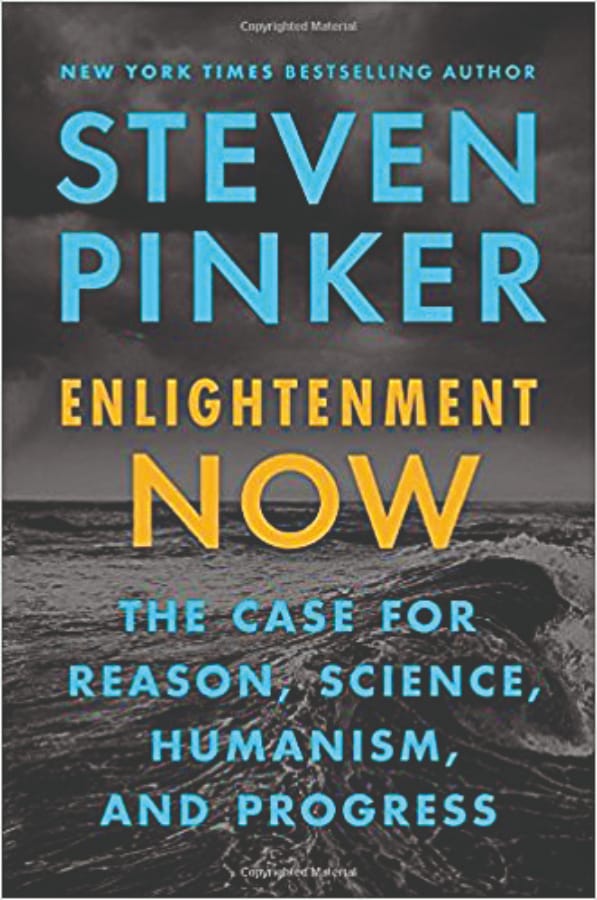An intellectual perspective on progress and positivity in Enlightenment Now
With the help of the philosophies of the Enlightenment and a wealth of statistics, Steven Pinker’s new book seeks to answer questions of the current state of humanity.

Where is the world headed? Are things getting better or are we approaching a darker period of human history? In his new book Enlightenment Now: The Case for Reason, Science, Humanism, and Progress, American cognitive linguist Steven Pinker makes the case for a more positive outlook for the future of humanity.
His argument is mainly based on one thing, namely a recollection of the four pillars of the enlightenment: reason, science, progress, and humanism. Pinker has been a strong advocate for all of them for many years. Today the principles of the Enlightenment laid out by thinkers such as Kant, Voltaire, and Hume have become part of the public mindset and their ideas are so ingrained into people that the actual original ideas have faded into the background.
Therefore, Pinker argues, it is necessary to reformulate and remind ourselves of all the values the Enlightenment stands for. Humans are not naturally rational animals, but through the establishment of rules and norms, democracies and markets, laws and constitutions, a free press and scientific societies we are capable of living up to the ideals of the enlightenment.
“Are things getting better or are we approaching a darker period of human history?”
One of the four pillars Pinker mentions stands out: progress. In contrast to all the others, he points out, progress is measurable and the question of whether the world is seeing progress and is becoming more enlightened can be subjected to scientific scrutiny. And this is exactly what fills most of the book: statistic after statistic from all sorts of areas from wealth and health to death by poisoning, one of the very few negative trends he mentions. All of them are associated with what most people would call progress of some form and are presented as the objective proof of the effect, which the enlightenment has had on our lives.
The issue is that modern intellectuals hate progress, Pinker thinks, and accuses the pessimistic attitude of a lot of academics, which resonates with the media, of leading people to focus on the negative aspects of progress.
The key question, of course, is whether all this is just a feeble attempt to distract us from problematic trends or whether it is actually a good ground for optimism. It is neither, I would say. Saying that Pinker turns a blind eye to any of the issues the world faces today would be too easy. After all, he does stress the point that progress has been happening continuously, but that it is certainly not inevitable. Neither can he be accused of mindless optimism; optimism yes, but in no way mindless since he does his best to back up his claims with empirical evidence.
“Progress has been happening continuously, but that it is certainly not inevitable”
What he perhaps does fall foul of is a guileless projection of what happened in the past onto the future. Events, trends, and developments that happened in the past under certain circumstances might not necessarily happen in the same way in the future, even if the circumstances remain unchanged. In general, his argument is surrounded by a hands-on buckle-up “yes, we can” mentality. Sure, climate change poses a huge challenge, but we can deal with it and if we just try, progress in all its various manifestations will eventually sort it out. His scientism and unbeatable faith in science in this sense are obvious.
So, are Pinker’s arguments reconcilable with the less optimistic worldviews of many other public intellectuals and the increasingly pessimistic feelings of the general public? I think they are. Obviously, Steven Pinker does not expect us to break down and shed hot tears of joy as we marvel at the wonders we humans have created. I think it is about a shift in perspective, maybe even just a very slight shift.
As Pinker argues, there is no point in completely disregarding all the evidence for positive change. On the other hand, it is wrong to think that science and reason will sooner or later solve every problem that humanity has and will encounter. What we need is to rediscover all the great things that happened as a result of the enlightenment and that is, I think, what Enlightenment Now aims to do. It is a gentle reminder for people who are fed a diet of bad news, that progress is happening and that so far, in spite of war, famine, and disease, humanity has managed to set up a framework, that makes a better future a genuine possibility.










